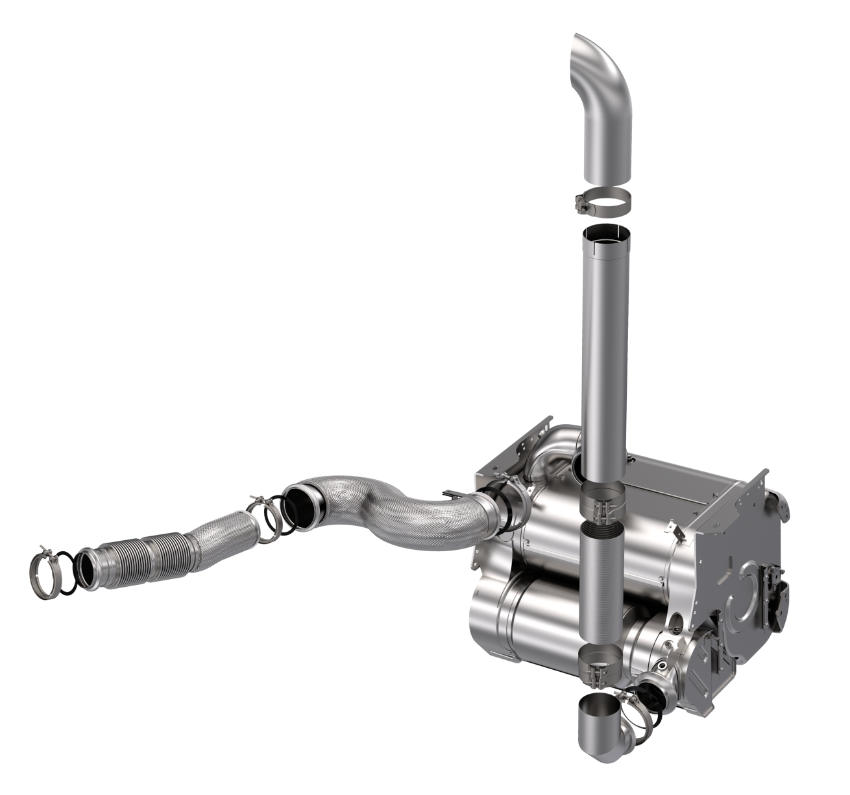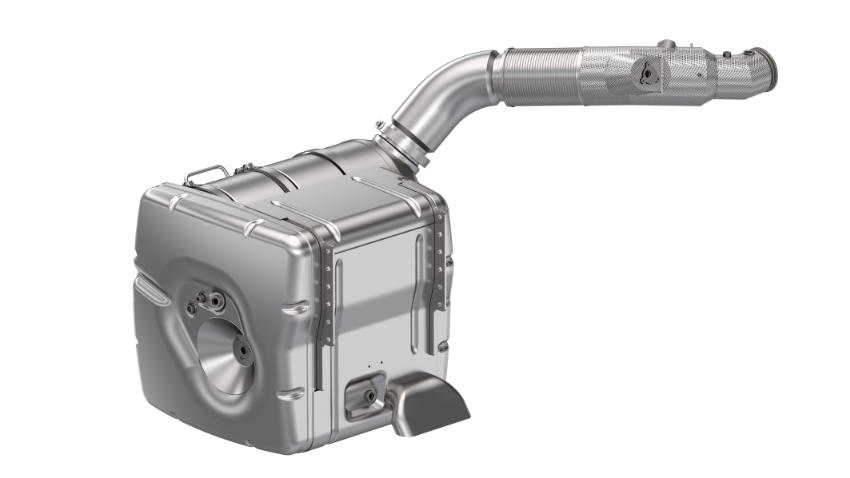Dinex has been in the Clean-Air business since 1982. Based in Denmark the company is a family-owned international developer and producer of heavy-duty exhaust and emission solutions, known for its innovative and agile approach in the partnership with customers. Dinex’s 2.000 employees serve some of the world’s most prominent manufacturers (OEMs) of trucks, buses, construction and agricultural machinery in the world, and they are a trusted and leading partner for quality spare parts for the independent Aftermarket in Europe and North America.
Interview with Kristian Kaufmann, Communication & Sustainability Manager at Dinex.
What are the main areas of activity of the company?
Kristian Kaufmann: A modern exhaust & emission system is based on a complex set of technologies, but Dinex is the only company that develops and produces all of them inhouse. This gives us a unique understanding and ability to deliver optimized solutions to our customers.
In the OEM industry, we are known for being timely ready with the right technologies to prepare our customers and their vehicles to meet upcoming emission standards, and tailoring solutions to perfectly meet demands.
When it comes to spare parts for the Aftermarket, Dinex utilizes its OEM expertise to develop and produce products that meet or exceed market standards, while remaining competitive. In addition, the growing complexity of exhaust systems means that more and more of our customers turn to us for training, troubleshooting and guidance.
What’s the news about new products/services?
K.K: First of all, it’s hard to get around the Remanufacturing and Reconditioning trends in the aftermarket these days. A modern exhaust system contains a lot of expensive and complex technologies, so when it fails it can be a costly affair for the truck owner to replace it – and production of new spare parts has a considerable footprint throughout the entire value chain, both considering energy consumption and raw material extraction.
Therefore, we see it as an immensely positive trend that the trucking industry is turning more and more to solutions that support a more circular way of thinking. Repairing only what is broken, replacing with reconditioned parts rather than new, etc… It’s a win for the trucker’s wallet, and for the planet as well, and Dinex is especially growing its portfolio of products and solutions supporting this specific trend.
Besides that, if we look 5-10 years ahead, we have new emission standards that are taking effect in Europe, North America and India, that will reduce the amount of pollutant emissions from heavy duty engines to a level which is practically near-zero. Dinex has already presented a range of technical solutions to meet these new standards, such as Dual-stage SCRs, High-Porous Silicon-Carbide Filters, and Advanced Thermal Management, and are currently together with OEMs globally preparing to launch.
Looking even further ahead, it is clear that the industry is preparing for greener alternatives to traditional diesel engines burning fossil fuels. In this area we experience an immense interest in not only electrified solutions, such as Hydrogen Fuel Cells, but also solutions for combustion engines that run on Hydrogen, Bio-fuels and E-fuels. We have a dedicated R&D unit that focus specifically on these greener alternatives.

What are the ranges of products/services?
K.K: To put it short: Everything from Turbo to Tailpipe.
We specialize in emission solutions for heavy duty diesel and gas engines, and are expanding in these years also to support also Hydrogen Fuel Cells and Hydrogen engines.
Since the beginning, Dinex has been developing, producing and distributing complete exhaust systems, including piping, catalysts, particulate filters and all other components. We are one of the very few suppliers in Europe that deliver Euro VI emission technology to the Aftermarket which are officially Type Approved, meaning our customers can safely use our spare parts without risking legal action due to failed compliance to emission standards.
What is the state of the market where you are currently active?
K.K: It is clear that the OEMs are preparing these years for upcoming emission standards and alternative fuels and technologies supporting the green transition. Today more than 98% of all new heavy duty vehicles sold globally runs on diesel, but it will diversify significantly over the next 10-20 years. Important to mention is that there will not be one “silver bullet technology” that will solve both the environmental and climate challenges we are facing, and the market trends will not be the same in all parts of the world.
To support this diversification, suppliers like us need to evolve so that we can continue to support the OEMs with their diversified needs: And that is exactly what Dinex is doing these years.
If we look at the Aftermarket, which is typically 5-10 years behind the OEMs, we see now that the latest generation of emission standards are becoming predominant in both Europe and North America, and that is great news for the environment and for public air quality. But it’s also a challenge for our customers, who have to maintain and work with more complex technologies, and that is typically where they turn to Dinex for support, guidance, and confidence that the spare parts they get are produced in the proper quality.
What can you tell us about market trends?
K.K: In terms of volumes, the fleet of vehicles is expected to increase by some 20-50% in both Europe and North America, as the need for transport solutions is growing. Currently we see that older vehicles are being phased out in favor of those that comply with the latest emission standards (Euro VI and EPA 10), and these vehicles are expected to be in operation at least until 2050.
Soon we will have the Euro 7 and EPA27 emission standards kicking in, and later we will see the before-mentioned diversification into Hydrogen and alternatively fueled applications. Together with the more circular approach we see in the Aftermarket, it is clear that trucking is only getting cleaner and greener from here on.

What are the most innovative products/services marketed?
K.K: In the Aftermarket we are particularly proud of our Diesel Particulate Filter (DPF) Reconditioning solution. Traditionally, cleaning a truck’s DPF must be done every ~200.000 km (depending on driving pattern), and it requires at least 1 day of downtime in the workshop. With Dinex’ Recon-solution, truckers can buy a reconditioned filter, and hand in their “dirty” unit in exchange for credit, meaning the down-time is reduced to less than an hour.
The “dirty” filter is then reconditioned by Dinex using a proprietary technique, which restores it to a near-new state meaning the cleaning interval is considerably extended, the fuel economy is improved, and the lifetime of the individual filter is extended. Less downtime, less fuel, less costs and less production of new parts: A perfect example of a good business case that aids our planet as well.
If we look to future technologies, a vastly overlooked area in the debate about decarbonizing the transport industry, is Hydrogen Combustion Engines, or shortly: H2-ICE. A traditional engine modified to burn hydrogen, with a minimal of pollutant emissions and near-zero carbon emissions. It’s important because Hydrogen Fuel Cells are still 10-15 years from gaining commercial breakthrough, and the availability of green hydrogen is still very low. H2-ICEs can help push the market demand for green hydrogen forward much sooner.
At the IAA exhibition in 2022, Dinex presented one of the world’s first emission aftertreatment solutions for H2-ICEs, which spouted a massive interest among vehicle manufacturers around the world. The solution effectively reduces pollutant NOx-emissions during a wide range of operating conditions without any active temperature management, thanks to Dinex’ innovative NOx Storage Catalyst (NSC) technology, making H2-ICEs practically near-zero emission.
What estimations do you have for 2024?
K.K: As previously stated, the Aftermarket’s need for technical competences, support and confidence in the spare parts they buy, is growing, and we support this trend with our training programs and high-quality spare parts.
In the OEM industry, the development and engineering processes to prepare for upcoming emission standards and alternative powertrains is already ongoing and will continue until implementation within the next 5-10 years.
Generally, the transport industry is in the middle of an exciting transformation in all aspects, and a lot of the things we do in these years will have a major impact on both how the industry evolves in the future, as well as the business.

